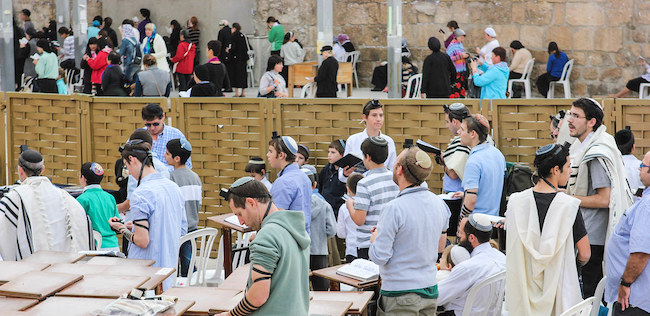
The opening pasuk of the parsha reads, “And these are the judgments (v’Eleh haMishpatim) that you shall place before them.” [Shemos 21:1]. Rashi comments: Wherever we find the word Eleh (these) without the prefix “v” (and), it implies rejection of that which had been stated previously (i.e., “these, but not those”). Wherever it says v’Eleh (and these) (as it does here), it adds on to that which has been stated previously (i.e., “not only those, but these as well”).
Rashi explains that in this context, the “vov prefix” is coming to specify that not only those earlier mitzvos mentioned in Parshas Yisro (the “Ten Commandments”) are from Sinai, but these civil laws mentioned in Parshas Mishpatim are from Sinai as well.
The question is, is this not obvious? Why does the Torah need to tell us this? Why do I need this extra letter in the Torah to teach us this “novelty” (chiddush)? Might I have thought that these laws in Parshas Mishpatim are not of Sinaitic origin?
There are different answers given to this question. I would like to share a beautiful idea that Rav Hutner, zt”l, writes in his Pachad Yitzchak on Shavuos (Ma’amar 41). This Chazal is teaching us that we should not think there is something more religious or more spiritual regarding the commandments between man and G-d than regarding those between man and his fellow man. The overwhelming majority of laws in Parshas Mishpatim deal with mitzvos bein adam l’Chaveiro (societal obligations). Mishpatim contains very “mundane mitzvos“: My ox gores your ox; I ask you to watch my wallet; you find my pen. These are literally basic laws of interpersonal relationships.
Someone could perhaps think that “religion” only involves laws between man and G-d. If someone asks the “man on the street” to define “religious law,” he no doubt would say, “religion is about praying to G-d; religion is about believing in G-d; religion is about theology.” What about returning a wallet? What is that? “That is not religion. Maybe it is being a nice person; maybe it is being a good citizen; maybe it is being a fool! But it is not religion! Religion involves the Church or the Synagogue. Religion is about G-d.”
The Torah’s approach is different. “Just as those (the “Ten Commandments”) are from Sinai, so too these (“mundane laws of civil behavior”) are from Sinai. The consequences of my ox goring yours is as much about the Word of G-d and Torah from Heaven as “I am the L-rd your G-d…” The same attention, detail, and meticulousness that a person places on to how he bakes matzah should be given to how we talk about another person and how we treat another person.
Rav Hutner buttresses this idea by citing another passage at the end of this parsha. “To Moshe He said, ‘Go up to Hashem, you, Aharon, Nadav, and Avihu and seventy of the elders of Israel, and you shall prostrate yourselves from a distance…'” [Shemos 24:1] The last passage of Mishpatim describes the covenant entered into between the Almighty and Klal Yisrael the day preceding Matan Torah (Giving of the Torah).
“He sent the youths of the Children of Israel and they brought up olah-offerings, and they slaughtered bulls to Hashem as peace-offerings to Hashem.” [Shemos 24:5] There is a whole ceremony. “Moshe took half the blood and placed it in basins, and half the blood he sprinkled upon the altar.” [Shemos 24:6] “He took the Book of the Covenant and read in earshot of the people, and they said, ‘Everything that Hashem has said, we will do and we will obey'” [Shemos: 24-7]. These famous words – Na’aseh v’Nishmah – occur over here in Parshas Mishpatim, which chronologically occurred prior to the giving of the Asseres Hadibros (“Ten Commandments”) (even though the Asseres Hadibros are recorded in the preceding parsha of Yisro). Then we have the formal execution of the covenant: “Moshe took the blood and sprinkled it upon the people, and he said, ‘Behold the blood of the covenant that Hashem sealed with you concerning all these matters.'” [Shemos 24:8]
Rashi comments (verse 6) on the words “And Moshe took half the blood” – “Who divided it in half? An angel came and divided it.” Why could Moshe Rabbeinu not have done this? He could have taken two cups and poured roughly equal amounts of blood into each cup and he would have the blood divided half and half. Okay, so he may have been a fraction of an ounce off one way or another, but who cares?
No! An angel of G-d came and divided the blood! Why an angel? The answer is because the blood had to be divided precisely. We hold that human beings cannot be exact (ee efshar l’tzamzem [Gittin 78a]) in their measuring. Only angels can be exact. Why was it so important to be exact? Because half the blood went on the Mizbayach and half the blood went on the people. The blood on the Mizbayach represented the part of the covenant symbolizing the commandments “between man and G-d”; the blood sprinkled on the people represented the part of the covenant symbolizing the commandments “between man and his fellow man.” These two halves need to be exact because these two components of Torah law are exactly equal in importance! Just as these are from Sinai, so to these are from Sinai!
Rav Hutner also points out something interesting about the way that the word Luchos (“Tablets” referring to the Tablets of Stone that contain the Asseres Hadibros) is written in the Torah. We always call them “Shnei Luchos” – the two Tablets. However, each of the six times the word appears (Shemos 24:28; Devorim 9:9 (twice); Devorim 9:10; Devorim 9:15; Devorim 10:1), it appears without a second vov – Lamed, Vov, Ches, Taf (rather than Lamed, Vov, Ches, Vov, Taf). The Ksiv (the way it is written in the Torah) is Luchas – as though it refers to a singular Luchas – (one) Tablet! The message is that it IS one tablet! The laws of Bein Adam L’Chaveiro and Bein Adam L’Makom merge, as it were, into a single set of equally Divinely-ordained requirements of the Jewish religion.
People are meticulous to the nth degree when it comes to mitzvos bein Adam l’Makom. We have a Mishneh Berura with small paragraphs (s’if katans) and super-commentaries (e.g. – Sh’ar haTzions) and people follow the “letter of the law” without deviating from it a hair’s breadth. Unfortunately, this meticulousness is not always as strong regarding commandments between man and man. However, in reality, it is all has the same level of importance.
Rav Hutner writes, as is his style (k’darko b’Kodesh), that the Mishna Berura, which occupies so much of our lives, was written by the Chofetz Chaim. The Chofetz Chaim (Rav Yisrael Meir Kagan) was a prolific author. His two other most-famous works are Shmiras HaLashon and Sefer Chofetz Chaim, about the laws of guarding one’s tongue and avoiding slander.
It is no coincidence that both the laws of daily ritual observance (Mishna Berura commentary to Shulchan Aruch Orach Chaim) and the laws regarding proper speech were written by the same person. The same precision in mitzvos regarding how we bake matzah or how to make tzitsis or how to write the letters of Tefillin—that same precision needs to be applied to laws between man and his fellow man. The Chofetz Chaim wrote a whole sefer—Ahavas Chessed (Love of Kindness)—describing these law in meticulous detail.
Rav Hutner writes that the Mishna Berura (involving ritual law) and the other volumes the Chofetz Chaim wrote regarding laws between man and man “came from the same quill and from the same heart.” They came from the same author, the very same individual.
He begins this piece by pointing out a historical anomaly. At least in the Yeshiveshe-Litvishe world, the person who gets credit for putting the Torah’s laws between man and man “back on the map” of halachic concern was Rav Yisrael Salanter. He put great emphasis on these matters. There is a famous story with Rav Yisrael Salanter. When he was too old to himself go and bake matzahs, the students who were going to go bake for him inquired, “So, what are your hidurim (exceptionally pious requirements) regarding baking matzahs?” He replied, “Make sure not to yell at the woman who cleans up the place between every baking because she is a widow and you should not violate the prohibition of oppressing widows and orphans [Shemos 22:21].” This incident says it all about Rav Yisrael Salanter.
Rav Hutner notes that Rav Yisrael Salanter’s Yahrtzeit always falls out during the week of Parshas Mishpatim—because this was the essence of his Torah philosophy: The laws of Mishpatim. This is Toroso shel Rav Yisrael Salanter.
Ritual Laws relating to G-d and Ethical Laws relating to our fellow man—they are all in the same Shulchan Aruch. They were all on the same Tablets of the Covenant. They all require the same meticulous observance and attention to detail.
Transcribed by David Twersky; Jerusalem [email protected]
Technical Assistance by Dovid Hoffman; Baltimore, MD [email protected]
This week’s write-up is adapted from the hashkafa portion of Rabbi Yissochar Frand’s Commuter Chavrusah Series on the weekly Torah portion. A listing of the halachic portions for Parshas Mishpatim is provided below:
- # 043 Malpractice
- # 086 Withholding Medical Treatment
- # 134 Hashovas Aveida: Returning Lost Objects
- # 181 Medicine, Shabbos, and the Non-Jew
- # 227 Taking Medication on Shabbos
- # 271 Experimental Medical Treatment
- # 317 Wrecking a Borrowed Car
- # 361 Bankruptcy
- # 405 Litigating in Secular Courts
- # 449 Is Gambling Permitted
- # 493 Bitul B’rov
- # 537 Losing Your Coat at a Coat Check
- # 581 Lending Without Witnesses
- # 625 The Kesuba
- # 669 Rabbinical Contracts
- # 713 Adam Hamazik & Liability Insurance
- # 757 Midvar Sheker Tirchak: True or False?
- # 801 Oy! My Wallet Went Over Niagara Falls
- # 845 Is Hunting a Jewish Sport?
- # 889 The Neighbor Who Forgot To Turn Off The Fire
- # 933 The Mitzvah of Lending Money
- # 976 Will Any Doctor Do?
- # 1020 The Potato Baked in a Fleishig Pan – With Butter or Margarine?
- # 1064 The Doctor That Erred
- # 1107 5772 or 2012 What Should It Be?
- # 1150 Taking State Farm To Beis Din
- # 1193 “Dayan, If You Know What’s Good For You, Rule In My Favor”
- # 1237 The Case of the Sefer That Was Borrowed and Never Returned
- # 1282 Treating Ebola Patients; The Har Nof Massacre and Kidney Donations
- # 1325 Finding a $20 Bill in Shul / Finding A Comb in a Mikvah: Can You Keep It?
- # 1369 Lending Money Without Receiving an IOU Slip – Is It Mutar?
A complete catalogue can be ordered from the Yad Yechiel Institute, PO Box 511, Owings Mills MD 21117-0511. Call (410) 358-0416 or e-mail [email protected] or visit http://www.yadyechiel.org/ for further information.


